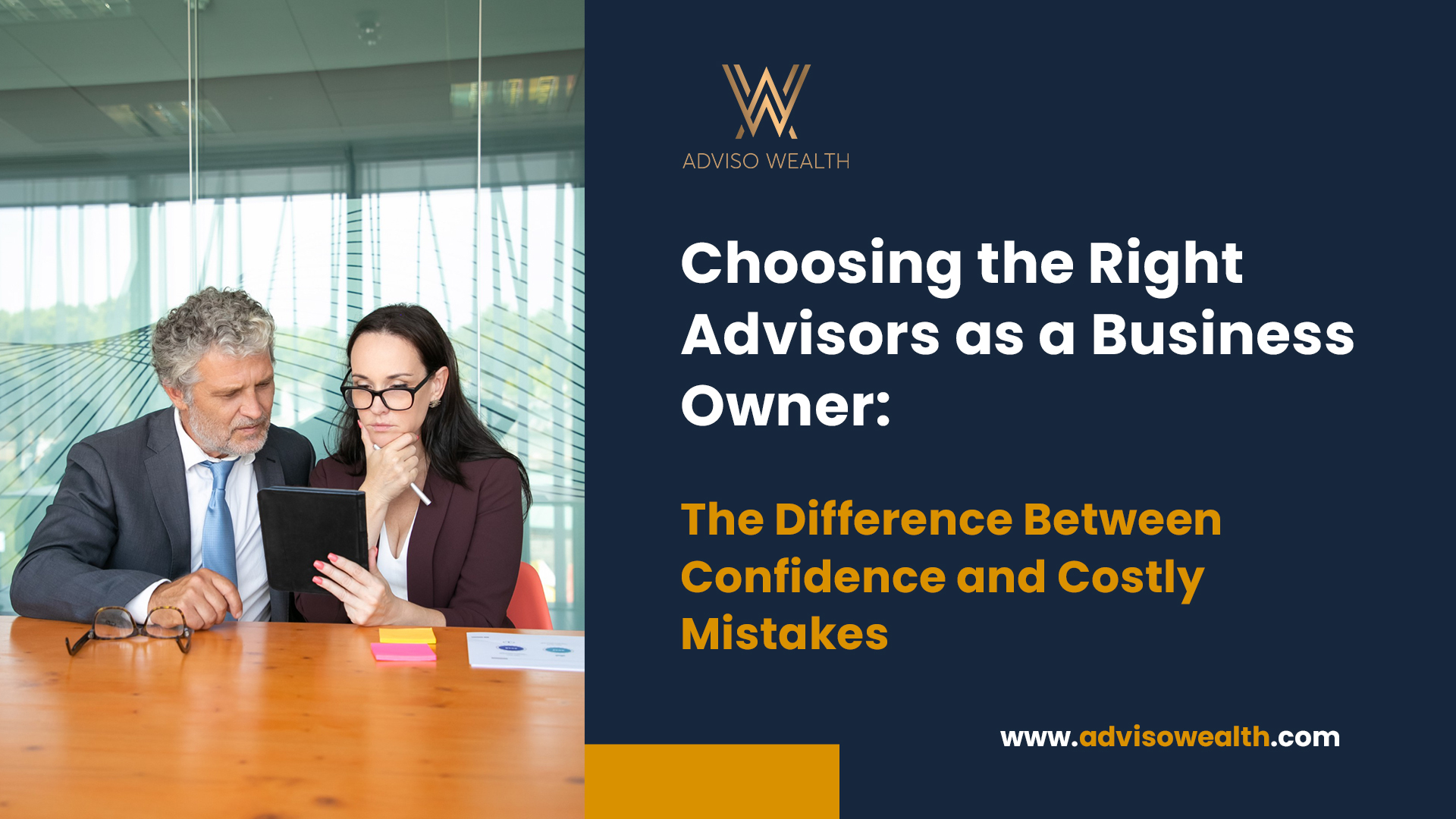Choosing the Right Advisors as a Business Owner: The Difference Between Confidence and Costly Mistakes

“We are a lonely people who are bad about talking about a very lonely topic: money.”
— Meghaan Lurtz, PhD in Personal Financial Planning
“Your work as advisors is critical—not just to business success, but for well-being.”
If you’ve built a business, you know how to solve problems. You’ve figured out how to hire, fire, market, sell, and keep the lights on. But when it comes to money—your business wealth, your personal wealth, and your future—most owners carry that burden quietly. It’s essential to have financial planning for business owners.
Money is lonely. And it’s lonely because the way most business owners get advice is fragmented. The CPA files taxes. The attorney drafts documents. The investment advisor manages a portfolio. Each does good work—but in their own lane. No one is connecting the dots.
And when no one is connecting the dots, it costs you. Not just stress, but real dollars.
Why Business Owners Feel Alone About Wealth
In her research, Dr. Meghaan Lurtz references Arthur Aron’s famous intimacy study—36 questions designed to build authentic connection. The lesson isn’t that you need to ask your CPA who their dream dinner guest would be. It’s that surface-level questions don’t create meaningful outcomes.
Better advisors ask better questions:
- What scares you most about exiting your business?
- What makes you angry at work?
- What’s one financial goal you’ve had for years but never seem to accomplish?
These questions uncover the human side of wealth—the side that standard advice misses. And unless you have the right team, those conversations never happen.
The Cost of Fragmented Advice
Here’s what fragmented advice looks like in real life:
- The CPA tells you a Roth conversion will raise your tax bill this year—so you don’t do it.
- The investment advisor manages your money as if your business risk doesn’t exist.
- The attorney drafts an estate plan that doesn’t line up with your buy-sell agreement.
No one is wrong. But the result is wrong for you. That’s exactly what happens with fragmented financial planning for business owners—each professional does their job well, but without coordination, you still don’t get what you actually need.
And here’s where the hidden costs creep in:
- Missed Roth conversion windows — After you sell, your income drops for a few years. Those years are perfect for Roth conversions at lower brackets. If no one raises it, the window closes—and you face bigger required distributions later in life.
- IRMAA surprises — Two years after a liquidity event, Medicare premiums spike because of your higher income at sale. An extra $5,000–$10,000 a year in premiums isn’t life-changing, but it’s frustrating—and avoidable.
- Estate misalignment — I’ve seen wills that said one thing, buy-sells that said another, and retirement account beneficiaries that said something else entirely. The family ends up in probate court, even though “everyone had a plan.”
- Portfolio tax drag — Deploying millions all at once into a taxable account without planning asset location can add six figures of unnecessary taxes over a decade.
For a $5M business owner, these mistakes don’t look like “losing millions.” They look like losing 20–30% of your net worth in drips and leaks. That’s the kind of loss you feel every year, not just at closing.
Case Study: Two Owners, Same Sale Price, Very Different Outcomes
Owner A sold her business for $5M with a traditional setup—a CPA, an attorney, and an investment advisor working separately. After taxes and misaligned planning, she walked away with about $3.5M of usable wealth.
Owner B also sold for $5M. But before the sale, she worked with a coordinated team led by a financial planner who connected tax, estate, and investment planning. The team adjusted deal structure, planned around taxes, and aligned her estate plan. She walked away with closer to $4.2M after tax—and with a clear income plan for the next chapter of life.
Same sale price. Same business. Nearly $700,000 of difference—simply because one team worked in silos, and the other worked in sync. Look, financial planning for business owners requires this same coordination. Your tax advisor, attorney, and wealth manager can’t just work in their own little bubbles—they need to actually talk to each other and work together like they’re all on your team.
What the Right Team Looks Like
The right advisory team isn’t about having the most credentialed person in every chair—it’s about coordination. Here’s the lineup most business owners need:
1. A Tax Strategist (Not Just a Preparer)
Someone who designs strategies around entity choice, timing of income, retirement plans, and charitable giving—not just someone who files returns.
2. An Estate Planner Who Understands Entrepreneurs
Your family, your succession plan, and your liquidity need to be in sync. A generic will isn’t enough.
3. An Investment Manager Who Respects Concentration Risk
Your business was already your biggest bet. Your portfolio should be built around that reality, not as if it doesn’t exist.
4. A Financial Planner Who Connects the Dots
The quarterback. The one who brings all the pieces together into a single, coordinated plan.
What’s at Stake if You Do Nothing
Here’s the uncomfortable truth: doing nothing is itself a decision—and it’s usually the most expensive one. For financial planning for business owners, procrastination doesn’t just cost money—it costs opportunities that may never return.
If you sell your business without the right team in place:
- You could lose 20–30% more than necessary to taxes.
- You could end up with assets in the wrong accounts, paying avoidable taxes for decades.
- You could face higher Medicare premiums or unexpected estate headaches.
- You could retire with uncertainty instead of clarity—always wondering if you missed something.
It’s not about whether you’ll be “okay.” Many business owners will be fine, even with fragmented advice. But “fine” isn’t the goal. You didn’t build your business to settle for fine. You built it for freedom. And freedom comes from planning ahead, not cleaning up after the fact.
How to Vet Advisors
When choosing your advisors, ask these five questions:
- Who do you usually work with? (If it’s not business owners, that’s a red flag.)
- How do you coordinate with others on my team? (If they don’t have a process, you’ll be the one coordinating.)
- How are you compensated? (Fee-only is usually the cleanest.)
- What blind spots do you see in my current plan?
- What happens if I do nothing for 12 months?
The right advisor will have clear, thoughtful answers. When it comes to financial planning for business owners, clarity isn’t just preferred—it’s essential.
Turning Loneliness Into Confidence
As Dr. Lurtz reminds us, money is a lonely topic. And yet, your advisors play a role that’s not just financial—it’s about your well-being.
The wrong team leaves you isolated, stressed, and quietly losing wealth. The right team gives you confidence, clarity, and freedom.
Final Thoughts: Don’t Leave This to Chance
You’ve worked too hard to let fragmented advice erode your wealth. The difference between the wrong advisors and the right ones isn’t just technical—it’s the difference between walking away uncertain and walking away free. Strategic financial planning for business owners demands advisors who think like entrepreneurs, not employees.
That’s why I created the Clarity Session. It’s built for business owners who want to:
- See the full picture of their wealth, not just pieces.
- Spot blind spots and risks before they cost real money.
- Build an advisor team that works together, not in silos.
Because when it comes to your wealth, coordination isn’t optional—it’s everything.
Disclaimer
All written content is for information purposes only. Opinions expressed herein are solely those of Adviso Wealth, unless otherwise specifically cited. Material presented is believed to be from reliable sources and no representations are made by our firm as to another parties’ informational accuracy or completeness. All information or ideas provided should be discussed in detail with an advisor, accountant or legal counsel prior to implementation.
